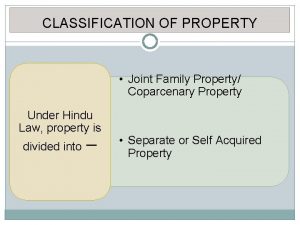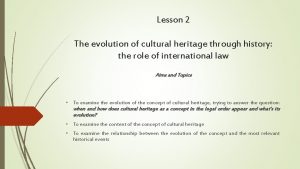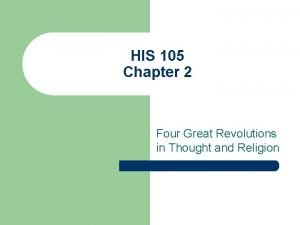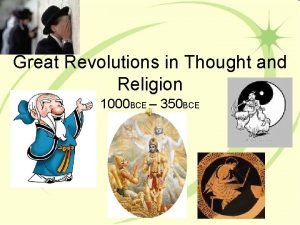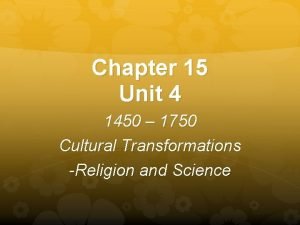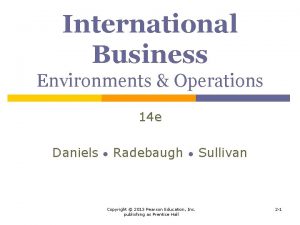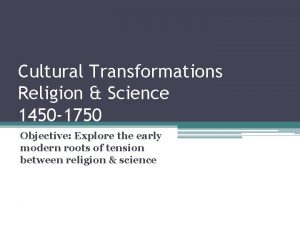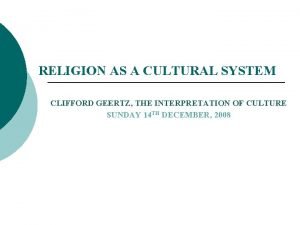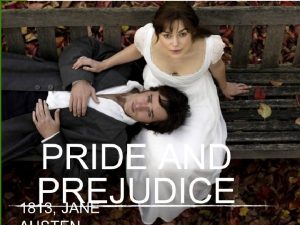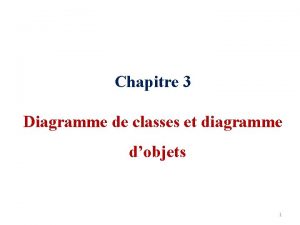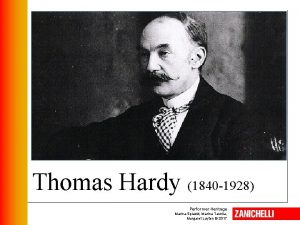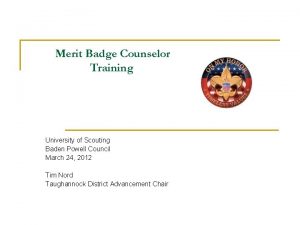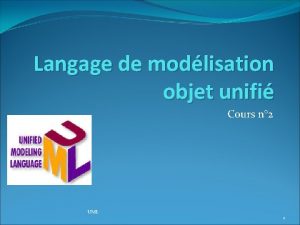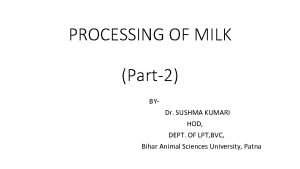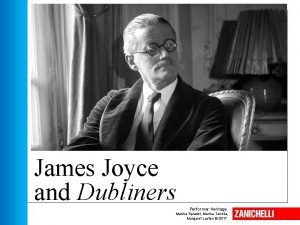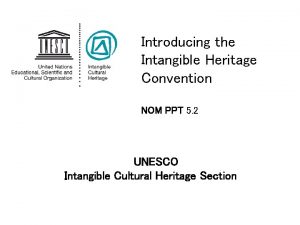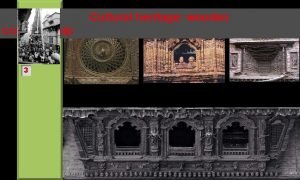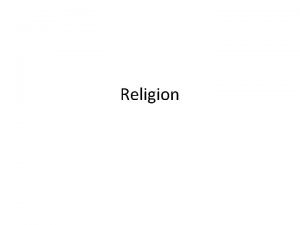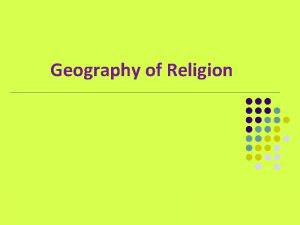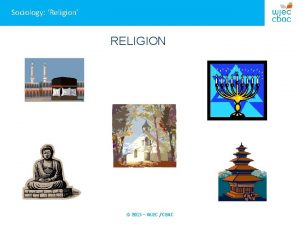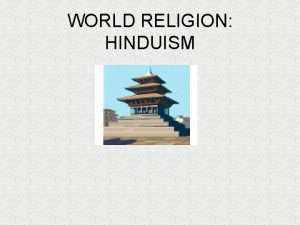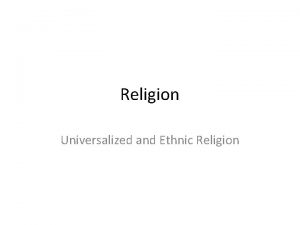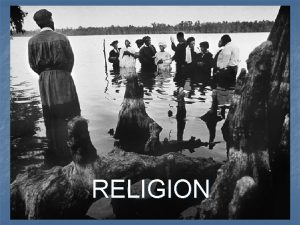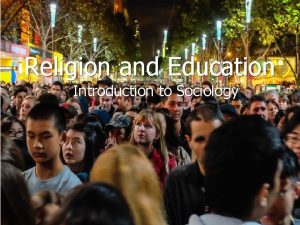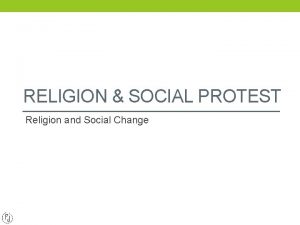Christian Cultural Heritage Western Thought Religion Western Thought


















































- Slides: 50

Christian Cultural Heritage Western Thought & Religion

Western Thought & Religion What is religion? Universally recognized phenomena Historically, humanity is overwhelmingly religious People generally look beyond themselves David Hume – “In the history of mankind there never has been a tribe of men without some form of religion. ” Secularism denies humanity’s overwhelming religious nature to look beyond itself. Video – Hate religion, love Jesus

Western Thought & Religion The word religion From Latin – religia Religia – means “to unite” Unite humanity with divine sphere (generally western) Eastern religions look to the oneness of all being Indigenous religions seek to live in harmony with “god-imitating” structures of tribe or ethnic group

Western Thought & Religion The word religion In Greek – qhraskeia, thraskos (Jam. 1: 26 -27; Col. 2: 18 worship of angels) Etymologically may refer to conduct and practice Acts 17: 22 and 25: 19 – deisidaimonious and deisidaimonias Deidw – to fear Daimon – demon; deity; minor deity

Western Thought & Religion Function and Direction of Religion functions to guide humans toward a purpose in life in connection with a superior power Religion has some object of faith

Western Thought & Religion Deity: Relational and Non-relational Relational Superhuman in character and power Super sensuous or invisible but able to represent himself in material and understandable ways Exercises rule over the natural world Exercises rule over humanity’s welfare Deity is responsive to humanity Deity arouses awe, worship, and submission

Western Thought & Religion Deity: Relational and Non-relational Non-Relational Deism Impersonal metaphysical being or power Philosophical Hinduism Taoism Abstract principle Unifying force of all things

Western Thought & Religion Definition of Religion Not easily defined - Depends on location experience or commitment = transcendence, human nature, human society “Religion is a mental faculty or disposition, which independent of, nay in spite of, sense and reason, enables man to apprehend the Infinite under different names and under varying guises” (Max Muller 1882, 13 Introduction to the Science of Religion)

Western Thought & Religion Definition of Religion “Religion is the recognition of all duties as divine command” (Immanuel Kant, Critic of Practical reason, trans. Abbott, p. 226) “The essence of religion is the feeling of absolute dependence” (Schleiermacher, Discourse on Religion, ch. 2) “Belief in spiritual beings” (Eerdman’s Handbook on The World’s Religions)

Western Thought & Religion Definition of Religion William James – “consists of the belief that there is an unseen order, and that our supreme good lies in harmoniously adjusting ourselves thereto” (1902 The Varieties of Religious Experience, p. 53) or “Religion is the feeling, acts, and experiences of individual men in their solitude, so far as they apprehend themselves to stand in relation to whatever they may consider the divine. ”

Western Thought & Religion Definition of Religion Paul Tillich defined religion as that which is of “ultimate concern. ” Problems: With this definition any thing that of the most concern to a person is classed a religion Patriotism Nationalism Family

Western Thought & Religion Definition of Religion “A religion is a system of beliefs and practice that provides values to give life meaning and coherence by directing the person toward transcendence” (Winfried Gorduan, Neighboring Faiths 1998, p. 21) What one may call a religion may not be, it could be a belief system, cause, or societal system that one is committed to but it does not constitute a “religion. ”

Western Thought & Religion Which of these is a religion? Seeking oneness with the universe Service to humanity Worship of spiritual being or beings Communism Fixated on Elvis Is there a difference between being religious and being spiritual? Religious – spirituality shown through ritual Spiritual – belief without ritual

Western Thought & Religion Six Factors in Identifying Religion Usually focuses on peoples’ relationship to the unseen realm of god(s), spirits, ancestors, and demons. There is a system of myths, prophecies, and rituals illuminating the spiritual realm for communing with or propitiating the spiritual being. There are organized rituals, places of worship, holy people, and writings in their history. There is a view to something beyond the current physical existence on which to focus There is a code of conduct or moral order. There has been a large group of believer some time.

Western Thought & Religion Elements of Religion Provides the core values by which life is given meaning and goals. Directs one toward a transcendent awareness or experience Through a supernatural means Through metaphysical principles Through an ideal Through a place or an awareness Provides a means for understanding the world

Approaches to Religion Subjective or Psychological Evolutionary Monotheism as the Source of Religion

Psychological or Subjective Concepts of subjective theory Religion is based on subjective, subconscious feelings that are given physical expression Developed to fulfill the needs of men Religion as a part of humanity – source not important Specific beliefs and practices are expressions of subconscious symbols and attitudes Divine revelation is the product of peoples’ expressions of their psyches Rituals allow for an outlet for subconscious religious drives

god/spirit GOD Psychological/Subjective Approach Monotheistic Approach

Psychological or Subjective Important Contributors to Subjective Theory Friedrich Schleiermacher (1768 -1834) Begins with a feeling of dependence Not a set of beliefs Dependence on an absolute , which is God Proceeds from the feeling of dependence to the idea there is an object of dependence, not the idea there is a God Ludwig Feuerbach (1804 -1872) Concept of God is a being with idealized human traits taken to their ultimate characteristics Worshipping God is worshipping the ideal self-image See Essence of Christianity ~ 1840 s

Psychological or Subjective Important Contributors to Subjective Theory Sigmund Freud (1856 -1939) Psychological need for a father figure God is an idealized father figure (people substitute idealized image for imperfect father figure) Religious nature is a symptom of psychological immaturity Rudolf Otto (1869 -1937) Published “The Idea of the Holy” in 1917 A person is overwhelmed with a feeling of God’s greatness and majesty and one’s own limitations – a feeling of fear and awe Psychological experience from subconscious nonrational faculties

Psychological or Subjective Important Contributors to Subjective Theory C. G. Jung (1875 -1961) Human dreams from subconscious are expressed in religion Mercea Eliade (1907 -1986) University of Chicago Subconscious symbol manifest themselves in manifestations of the Holy

Psychological or Subjective Critic of Psychological/Subjective Religion God is a manifestation of the human condition Even if the subjective exists, it does not rule out the God as a reality apart from humanity Bible speaks of people created in the image of God but God is self-existing separate from humanity God may have given humanity a sense of dependence, feelings of the other, or an idea of the holy This view starts from self experience not revelation The question is did a sense of God begin with humans or with God?

Evolutionary Approach to Religion Concepts of the evolutionary approach Assumes an evolutionary view of life and culture Before Darwin (1700’s) there was an idea of the world moving from primitive to the more complex Darwin (1809 -1882) gave it a scientific setting There is a philosophical commitment to the idea of progress of humanity Primitive cultures indicate the earlier stages Cultural anthropology Search to find which culture represents the earliest forms of religion Assumes Western culture is highest known form

Theories in Evolution to Religion Animistic Theory Edward Burnett Tylor (1832 -1917) Primitive Culture (2 vols. 1871) Maintained that primitive people developed a sense of other or soul from experience with death and dreams Primitive people believed that these souls (Latin, anima) were to be found not only in people but in all nature (stones, trees, animals, rivers, springs, volcanoes, and mountains).

Theories in Evolution to Religion Herbert Spenser Developed concept of “Manism” R. H. Codrington (1823 -1900) studied under Tylor and developed further the idea of Mana – “idea that supernatural power that belonged to the region of the unseen. ” Gods of primitive people was based on dreams of the recent dead. Dead alive in another realm with chiefs and heroes which gave rise to ancestor worship Polytheism Gave rise to worshiped sky, earth, etc.

Theories in Evolution to Religion Nature-worship Theory Max Muller (1823 -1900) Oxford Professor From mythology of India Believed religion developed from observance of forces of nature which they saw the regularity of seasons, the tides, and phases of moon. “Primitive people identified the forces in nature, personified them, created myths to describe their activities, and eventually developed pantheons and religions around them. ”

Theories in Evolution to Religion Magic Theory Sir James George Frazer (1854 -1941) Cambridge The Golden Bough Though went through three phases: Magic - attempted to control the world of nature through magic (if not coerced by magic) Religion – nature can be implored to cooperate Science – rational understanding of nature

Stages of the Evolutionary Theory of Religion ? ? ? MONOTHEISM HENOTHEISM POLYTHEISM ANIMISM MANA/FETISHISM/MAGIC

Evolutionary Theory of Religion Proposed Stages Defined First: Mana/Fetishism - Mana From Melanesian cultures but present elsewhere General awareness of a spiritual force Non-personal force that does not reveal itself Force pervades the physical realm but unevenly distributed – some areas of have more force than other places or things Positive contact brings positive aspects to one’s life Negative contact causes problems in life One seeks a positive relationship

Evolutionary Theory of Religion Proposed Stages Defined First: Mana/Fetishism - Fetishism Fetish – an object is seen as endowed with a great amount of mana (doll, bone, stick, etc. ) Human must harness mana for positive effects Magic – the manipulation of human beings of spiritual forces in order to bring about a desired result (Corduan 1998, 27) Manipulation Correct technique for success Some approach religion this way, even in monotheism

Evolutionary Theory of Religion Proposed Stages Defined Second: Animism – (Latin anima = soul)

Evolutionary Theory of Religion Proposed Stages Defined Second: Animism – (Latin anima = soul) Definition – the belief and worship of spiritual beings that inhabit people, places, or objects Nature spirits – generally have human form and personality but not directly related to the humanity. They inhabit places, objects and animals. They may speak and may have a social order. Ancestor spirits – departed family members that may interact with living relatives generally for protection of the family and clan unless offended. Venerated ancestors usually influential as long as remembered by living person.

Evolutionary Theory of Religion Proposed Stages Defined Second: Animism – (Latin anima = soul) Finite – limited power, need to be informed (not surprised), may have specific domains, existence resembles physical but in spiritual realm, can do more than people Assistance to humans – spirits can provide insights to life’s direction for success (may use fortunetellers and soothsayers or diviners) or provide protection. Respect for spirits – keep harmony with family and community to honor ancestors (spirit can cause problems if not respected or going against family & clan Control – medicine men, witchdoctor or shaman who have means to gain cooperation of spirits or to control with magic

Evolutionary Theory of Religion Proposed Stages Defined Third: Polytheism (poly – many; theism – gods) Spiritual realm deified with transition from venerating spirits to worship of gods (worship of angels Col. 2: 18) Gods are vastly superior to spirits that are venerated Pantheon – all gods and goddesses within a particular religion Some hierarchy but fluid Based on tasks and family connections Worship – entreating their favor because they are more powerful than the spirits (worship is defined as recognizing divine beings as superior, submitting to them and entreating their favor) Not as easily manipulation as spirits Worshipped instead of the use of magic

Evolutionary Theory of Religion Proposed Stages Defined Third: Polytheism (poly – many; theism – gods) Three ways polytheism occurs from animism Exalting ancestors who were of high social status (chiefs or those who were deemed to have spiritual powers in life) Promoting nature and household spirits to divine status (location may be the home of a God – Meru on top mountains; fertility important for survival so gods and goddesses imputed) Personifying abstract principles (justice, love, does not have to be personified or have and image)

Evolutionary Theory of Religion Proposed Stages Defined Fourth: Henotheism – people believe in many gods but worship only one of them. Each clan or tribe choose a god that beneficial to them Gods may have geographical significance and rule certain areas or be over certain elements.

Evolutionary Theory of Religion Proposed Stages Defined Fifth: Monotheism – people believe in only one God Usually theorized to have begun with the Jews under Moses God is described as the creator of the world God alone is worthy to be worshipped God is the source of moral directives Other supernatural beings do exist but not as gods

Evolutionary Theory of Religion Proposed Stages Defined Sixth: What next? Some suggest Zen Buddhism – personal insights gained by one’s own will Secular humanism as the highest stage Science/Scientism – Unlike the use of the scientific method as only one mode of reaching knowledge, scientism claims that science alone can render truth about the world and reality. Scientism's singleminded adherence to only the empirical, or testable, makes it a strictly scientific worldview. Scientism sees it necessary to do away with most, if not all, metaphysical, philosophical, and religious claims, as the truths they proclaim cannot be apprehended by the scientific method. In essence, scientism sees science as the absolute and only justifiable access to the truth.

Subjective/psychological approach to God he dead t f o s m Drea Need for a father figure Fee lin g o Idealized self-image fd ep en de nc e Subconscious feelings and dreams GOD

Evolutionary approach to God Monotheism Polytheism Animism Mana Henotheism ? ?

Monotheistic Approach to God GOD Revelation Communication Nature Created in Image of God

Evolutionary Theory of Religion Critic of the Evolutionary Theory of Religion Never been seen to progress this way Changes occur both ways The first two stages often have gods associated with them and even a supreme being (Meru) Many traditional cultures show ties to monotheism Both Subjective/Psychological & Evolutionary Theories are bonded in a closed system Both contribute to a view of a “World without windows” – Peter Berger Both lead to secularization of cultures and societies. Both make God/religion/spirituality a human invention

Monotheism – Source of Religion Wilhelm Schmidt (1868 -1954) Studied linguistics 12 volumes Der Ursprung der Gotfesidde (The Origin of the Idea of God) Documented reports of traditional religions and cultures that referred to monotheism Documented many traditional cultures that have most of the basic monotheistic beliefs “Virtually every religion carries a vestige of monotheism that can be identified as a variation of the nine-point description” of monotheism (Corduan 1998, 33). A number of traditional cultures practice little or no magic but believe in one creator God.

Monotheism – Source of Religion Three basic inferences from “Original Monotheism Model” There is one clear change, moving away from monotheism, particularly in wealthier societies. Ritual and magic become prevalent as people move away from monotheism as seen in our present “modern world” Call to reform to the original monotheism develops (remember the O. T. prophets) Monotheism calls for a world with windows, humans as both spiritual and physical entwined, an open worldview and beings capable of both physical and spiritual relationsips.

Original Monotheism Model Monotheistic Traditions Original Monotheism Decay into Magic and Ritual Various Forms of Religious Change Mana Animism From Neighboring Faiths by Winfried Corduan, p. 35 Polytheism Henotheism

Monotheism – Source of Religion Begins with a God who reveals himself in history and humanity responds to his self-disclosure and produces religion Nine-point basic beliefs of monotheism One God (various levels or relationship) God is described with masculine qualities and grammar God lives beyond the created world God is extremely powerful & knowledgeable God created the world God sets the standards for good and evil Humans are God’s creation & subject to his standards Humans are alienated from God by disobeying standards God provides the way for humanity to be reconciled

The One God and Us God and Humanity God of relationship (love) God interacts and communicate with humanity Personal and involved Acts for the benefit of humanity now and eternally Sees perfectly and fully Humanity Created in God’s image Relational beings Humanity given custodianship of the world Created with an eternal nature Created for directed to seek the welfare of others

Christianity and God Christianity answers key questions of life. Why am I here? To live relationally with God and represent His love What should I love? God , others and self What should I live for? God’s desires and others welfare What is after death? Life eternal “Love the Lord your God with all your heart, soul, mind and strength and love your neighbor as yourself. ” “For God so loved the world …” “I am the way, the truth and the life” God Incarnate - Savior

Christians’ Approach to Other Religions Important criteria for sharing the gospel to those of other religions Live by the two greatest commandments, love God and your neighbor Treat every person and their religion with respect (golden rule) Live in peace with all people so long as it depends on your Learn from their understanding of their religion The theoretical understanding of a religion often does not agree with the daily practice and beliefs of its followers

Christians’ Approach to Other Religions Important criteria for sharing the gospel to those of other religions Look for points of contact between Christianity and their religion (Acts 17) Paul gave people credit for being religious and moved from there to the one God and then to Christ Note obstacles in their beliefs for further exploration Do not let your own cultural bias obscure or supplant the gospel message (Acts 15) Make the gospel intelligible to the host people (All thing to all people)
 Western religion vs eastern religion
Western religion vs eastern religion World heritage is our heritage slogan
World heritage is our heritage slogan Sapratibandha daya and apratibandha daya
Sapratibandha daya and apratibandha daya Doctrine of blending
Doctrine of blending Christian heritage edinburgh
Christian heritage edinburgh Beehive bendigo
Beehive bendigo Intangible cultural heritage and sustainable development
Intangible cultural heritage and sustainable development Hudhud chants of the ifugao threats
Hudhud chants of the ifugao threats Byzantine empire at its height
Byzantine empire at its height Cultural heritage meaning
Cultural heritage meaning Four great revolutions in thought and religion
Four great revolutions in thought and religion Aryan food
Aryan food Chapter 15 cultural transformations religion and science
Chapter 15 cultural transformations religion and science International business daniels 15th edition ppt
International business daniels 15th edition ppt Cultural transformations religion and science
Cultural transformations religion and science Religion as a cultural system
Religion as a cultural system Complete and incomplete thoughts examples
Complete and incomplete thoughts examples Uml heritage
Uml heritage Frankenstein plot zanichelli
Frankenstein plot zanichelli 10 steps to protect heritage places
10 steps to protect heritage places Performer heritage 2 pdf
Performer heritage 2 pdf What is heritage
What is heritage Performer heritage 1 pdf
Performer heritage 1 pdf Héritage diagramme de cas d'utilisation
Héritage diagramme de cas d'utilisation World heritage convention
World heritage convention Tess of the d'urbervilles themes
Tess of the d'urbervilles themes Scouting heritage merit badge worksheet
Scouting heritage merit badge worksheet Deqms
Deqms Century heritage fcu
Century heritage fcu The tangible and intangible heritage in my local area
The tangible and intangible heritage in my local area Five bridges wilderness heritage trust
Five bridges wilderness heritage trust Heritage park seals
Heritage park seals Calgary heritage authority
Calgary heritage authority Scouting heritage merit badge
Scouting heritage merit badge Zanzibar stone town heritage society
Zanzibar stone town heritage society Human heritage chapter 4
Human heritage chapter 4 Chapter 16 section 1 russia and the western republics
Chapter 16 section 1 russia and the western republics Uml heritage
Uml heritage Department of communities culture and heritage
Department of communities culture and heritage Heritage standardized milk
Heritage standardized milk Performer heritage 2 solu
Performer heritage 2 solu Heritage woods secondary school todd clerkson
Heritage woods secondary school todd clerkson The waste land performer heritage
The waste land performer heritage World heritage convention ppt
World heritage convention ppt Heritage flower company
Heritage flower company American heritage protective services inc
American heritage protective services inc Heritage maroc
Heritage maroc Camp roy c manchester
Camp roy c manchester George orwell powerpoint zanichelli
George orwell powerpoint zanichelli Human heritage chapter 28
Human heritage chapter 28 Chantal fortier
Chantal fortier



